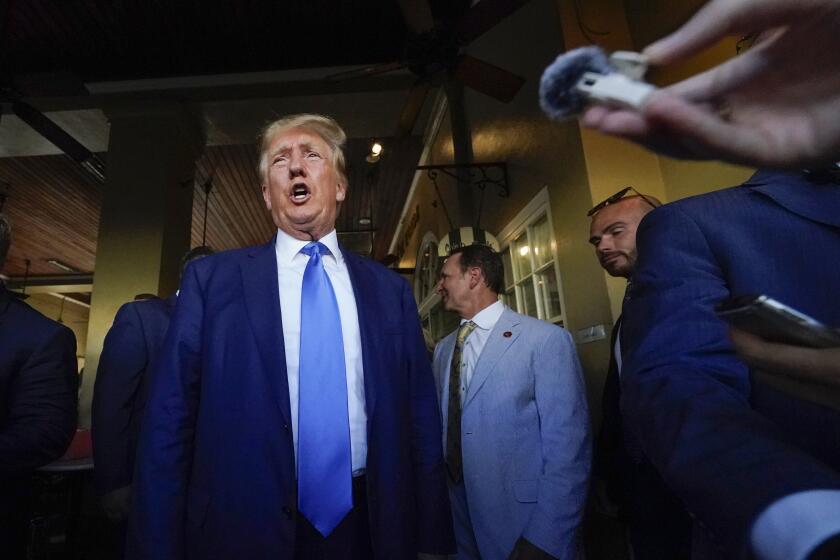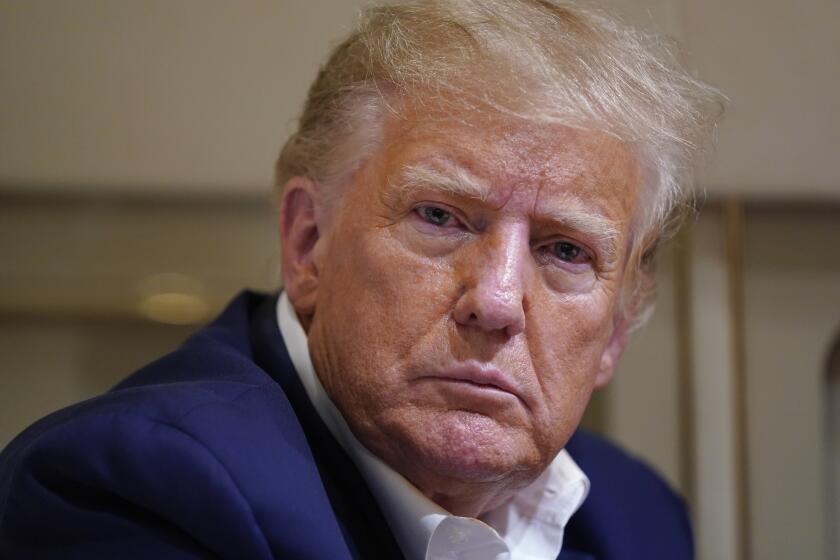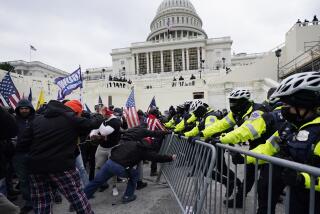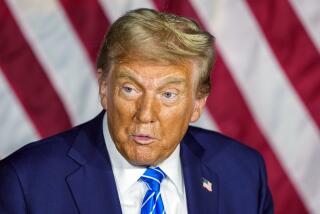Trump is facing his most important indictment yet — and nearly insurmountable odds at trial
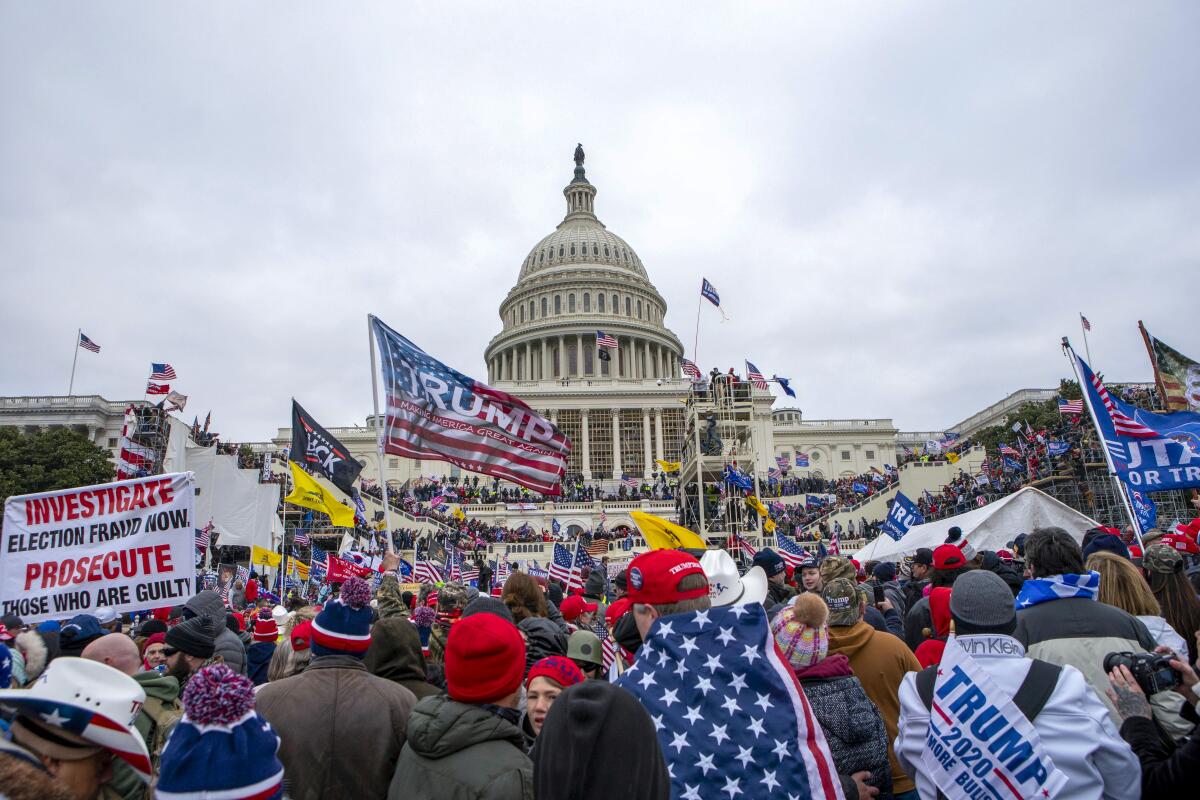
- Share via
The indictment of Donald Trump handed up in federal court in Washington Tuesday initiates the most important case in the country’s history.
The document lays out a flagrant series of attacks on the peaceful transfer of power and on constitutional rule itself.
The four counts against the former president include obstruction of an official proceeding — namely, Congress’ Jan. 6, 2021, certification of Joe Biden’s election — and three conspiracies: to defraud the United States, obstruct an official proceeding and deny voting rights.
Who were Trump’s alleged co-conspirators? Following Justice Department custom, the indictment does not name them because they haven’t been charged, but it isn’t hard to discern some of their identities from their descriptions in the document, including Trump lawyers Rudy Giuliani and John Eastman.
Charges may well follow against the co-conspirators, some of whom could choose to part company with Trump and cooperate with the government. But the decision to begin with a federal indictment of the former president alone — United States vs. Trump — underscores special counsel Jack Smith’s resolve to seek a relatively speedy trial, as he noted in a statement Tuesday evening. These latest charges against Trump, his third indictment (and probably counting), are now the most likely to proceed to jury trial before November 2024, when Trump looks increasingly likely to be on the ballot as the Republican presidential nominee.
The indictment alleges that Trump pursued discounting legitimate votes and subverting the 2020 presidential election results through three criminal conspiracies.
Another significant figure described in the indictment, former White House Chief of Staff Mark Meadows, is not characterized as a co-conspirator. That suggests Smith has secured Meadows’ cooperation as a government witness.
Without co-defendants, Trump will face trial against nearly insurmountable odds. His best hope now will be to delay the trial until after the election or attempt to get a holdout juror who will refuse to vote for a conviction regardless of the evidence. The prospects of an acquittal are vanishingly small.
Trump’s chances of achieving an extended delay of the trial on this indictment are dim compared with the previous federal indictment for retention of classified documents, in which the former president has the benefit of a possibly sympathetic judge, Aileen Cannon, and thorny legal arguments to make. We can expect him to mount vigorous challenges on the basis of executive privilege in the latest case, but the law is already fairly settled against him.
While Smith was characteristically laconic in his statement Tuesday, the second Trump indictment his team has produced is, like the first, extraordinarily detailed and informative. It lays out a series of three brazen conspiracies to steal the election from its rightful winner.
The core charged crimes stem from Trump and his co-conspirators’ efforts to replace legitimate electors with phony ones; delay the Jan. 6 proceedings by pressuring then-Vice President Mike Pence to exceed his constitutional role; and disenfranchise voters through the variety of shenanigans Trump and his team employed to “find” nonexistent votes in the six states he lost most narrowly.
Former President Trump was indicted on charges related to classified documents found at his Florida estate. Special counsel Jack Smith’s case is historic.
Smith could have gone for broke by charging Trump with seditious conspiracy. He chose not to — wisely in my view. The crimes he has charged will be simpler to prove and less vulnerable to appellate reversal down the line. If he can secure a conviction for those crimes, it will adequately hold Trump guilty in fact and in history.
Biden was the intermediary victim of Trump’s alleged treachery. But the ultimate victims, as the indictment makes clear, were the American people, who came closer than many would have imagined to having their right to choose their president criminally upended before their eyes.
Another important revelation Tuesday was the identity of the judge in the case: Tanya Chutkan, an experienced and well-regarded Obama appointee. And any appeals of her rulings will go to the U.S. Court of Appeals for the District of Columbia, which has proved wise to Trump’s legal hijinks and would be prepared to act quickly to cut them short.
Tuesday’s indictment is expected to be followed by a fourth set of charges against Trump, in Fulton County, Ga. But the accumulation of cases against him appears only to have helped consolidate his support for the Republican presidential nomination.
The latest indictment, its unprecedented gravity notwithstanding, isn’t likely to alter that effect. Trump will no doubt continue to make his supposed persecution the centerpiece of his campaign, suggesting he is some dark messiah fighting a deep state bent on the oppression of his supporters. In the perverse political culture for which he is substantially responsible, voters won’t just overlook the grievous allegations against him; they may see them as qualifications for the job he’s seeking.
That only compounds the enormous stakes of the charges. Smith and his team have no choice but to ignore the political cacophony and keep the focus on the 12 Americans who will return a verdict.
If the prosecution is interrupted by a Trump victory, we are lost regardless. But if Smith can prove these serious charges beyond a reasonable doubt, he will secure accountability for the worst series of political crimes in our history.
Harry Litman is host of the “Talking Feds” podcast. @harrylitman
More to Read
A cure for the common opinion
Get thought-provoking perspectives with our weekly newsletter.
You may occasionally receive promotional content from the Los Angeles Times.
